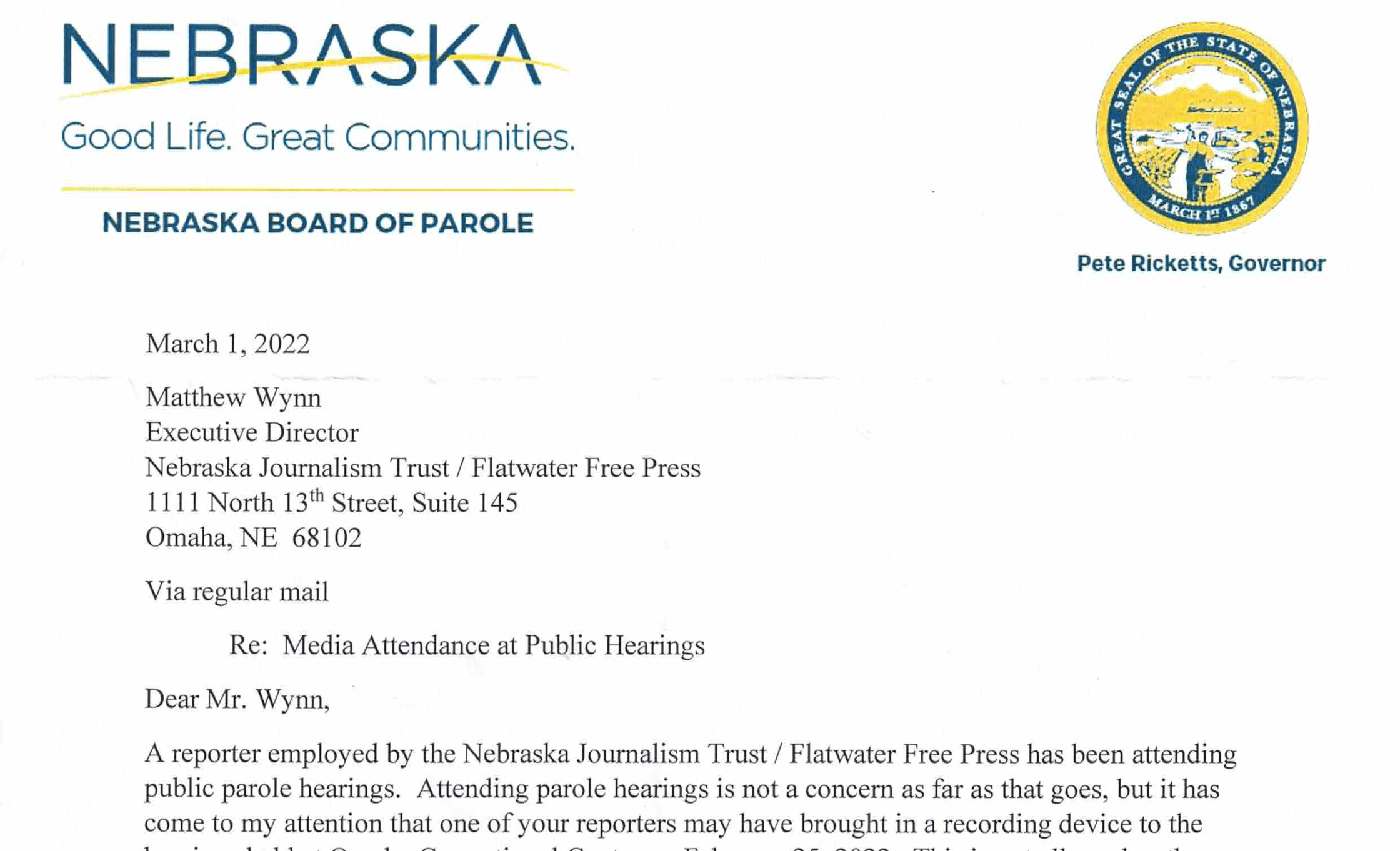Below is a letter I sent to our donors earlier this week. Occasionally, we like to give them a peek at the story behind the story. In this case, the reaction was so strong we’ve decided to post it for the public. Want to join our supporters? Click here.
In a career spent doing investigative journalism, I have seen some ludicrous reactions to reporters doing their jobs.
But the Nebraska parole board’s recent reaction to FFP reporter Yanqi Xu – who wanted to ask members why they often don’t attend parole board hearings – may quite honestly be in a class all its own.
If you read our story published Friday on our site and Sunday in the Omaha World-Herald, you know that the five members vote on hearings together just 37% of the time. You also know that the data shows that, when the full board doesn’t appear at a hearing, fewer prisoners are granted parole.
When Yanqi first identified this phenomenon in early February, it raised an obvious question: Why?
Why are parole board members missing hearings?
She traded some phone calls with Board Chair Rosalyn Cotton, who promised to get a date on the calendar to talk. She sent a few emails. But when she wasn’t getting that question answered, she did something that journalists have been doing since time eternal: She went to a public meeting. She waited for it to end, then approached the board to ask questions.
That interaction itself sounds strained but not all that unusual: Board chair Rosalyn Cotton told Yanqi that she would respond later. Cotton then – kindly, politely – had a guard escort Yanqi from the prison, where the parole board hearings were being held.
Afterward, Cotton emailed us a statement. We also received a short email from board member Bob Twiss. That has been the sum total of the response we have received from the parole board and the office of Gov. Pete Ricketts – the governor appoints parole board members.
Not a single public official agreed to answer questions about why parole board members aren’t showing up for parole board hearings. That in itself is deeply concerning.
But what happened after the meeting is truly mind-boggling.
Shortly after Yanqi was escorted out of that public parole hearing, we received a letter from the parole board’s attorney, Nicole Miller. Read it here.
It starts with a wild accusation against Yanqi. Our reporter, Miller claims, “may have brought in a recording device” to a parole board hearing. Such an act may constitute contraband, the letter says.
Keep in mind: This meeting was inside a prison. Had Yanqi done what she was accused of here, it would be a crime.
Of course, she didn’t. Anyone at that meeting who enters that correctional facility has to go through a metal detector. Knowing this, she left her phone in her car. Then she put her keys and other belongings into a locker outside the hearing room. She even took off her watch.
In short: It’s a patently false accusation.
When editor Matthew Hansen called Ms. Miller to discuss the letter, the lawyer immediately drew his attention to the word “may.” She also quickly told Hansen that she hadn’t actually been at the hearing, and had instead written the letter based on what she had been told.
The attorney for the Board of Parole, a group that could not be bothered to discuss attendance at parole hearings, wrote a letter to inform us that our reporter “may” have broken state law.
The next paragraph, somehow, is even more outrageous.
Yanqi, the letter claims, overstepped her bounds by asking questions at a public hearing.
The concept is so absurd it’s difficult for me to wrap my head around.
A reporter, acting in the public interest, attended a public hearing to ask a public official paid by public taxpayer money some important questions so we could notify the public of said public official’s point of view. Somehow, the letter claims, that is a mistake.
That’s exactly what we do.
I understand that it may be annoying to have to deal with journalists. We can be highly annoying!
But that isn’t our concern. Our job is thorough pursuit of the truth, and providing people every possible opportunity to respond to findings.
The ethics code of the Society of Professional Journalists specifically says it is a reporter’s job to “Diligently seek subjects of news coverage to allow them to respond to criticism or allegations of wrongdoing.”
We would do the same thing again. We will do the same thing again.
When I left Nebraska journalism in 2016, things weren’t perfect. I’ve been intimidated by officials. I’ve had sources text or call at all hours quibbling over a story’s premise or the wording of a finding.
But during the short life of the Flatwater Free Press, I have been shocked by the level of obfuscation that now appears normal.
It took months to get basic salary information out of our state government. We are still arguing over semantics with other state and local officials. In some cases, we’re being charged thousands of dollars for records requests. We have had officials simply refuse to talk. And now we’ve had the Nebraska Board of Parole, through their lawyer, scold us for attempting to ask questions in the first place.
I don’t know what the answer to this is beyond the fact that we’re going to continue to be transparent with our audience – that’s you – about both our stories and the messy work to arrive at them.
What I do know: This isn’t going to stop us. We will continue pursuing records and stories that are important. We will do so regardless of the roadblocks in our path, or absurd costs, or any future letters attempting to chasten us for doing journalism.
We exist precisely because this work is hard. We are here precisely because it’s important to keep doing it.
We’re happy to take it on.




8 Comments
Life ain’t getting any easier for reporters! I appreciated your original article on parole board hearings since I have had both personal and professional dealings with the board. This latest article is even more disturbing than the first. I do realize that those that work with law enforcement and corrections tend to develop a suspicious nature overall -it seems to be an occupational hazard but this was extreme. I am wary of those who avoid the scrutiny of journalism. Keep digging!
Appalling but not surprising obfuscation by the Ricketts administration which has made opaqueness a fine art…and gotten away with it because Nebraska is a one-party state. Flatwater Freepress should investigate the activities of the Nebraska Environmental Trust Board…all but one Ricketts appointees who dole out $20 million a year of lottery money to “conservation” projects with no oversight or transparency. That’s why a watchdog “Friends” group was formed to shine some light on their dealings.
Thanks again for adding more to the story! Keep up the great investigative journalism. It is obvious that it is needed so thank you!
Wow! I am new to FFP and am impressed by the reporting of this issue. I can’t ask a public official a question during a public meeting/forum? Where is the freedom of speech?
Great work in the efforts to expose the truly irresponsible absentee Parole Board members. Is there a public record if each member’s absences?
Let me get this straight. These are full time jobs for which parole board members are not showing up? That would normally be grounds for termination in most companies. Other than normal kinds of absences…. vacation, sick leave…. the percentage of members present for each hearing should be much closer to 100%. 37% is an abysmal record and should not be tolerated by those who appoint them or the taxpayer. That record is, bottom line, stealing from an employer.
Dedicated unbiased journalism is crucial to the public’s right to know. Ineffective public officials who hide behind lawyers and level obviously false accusations against reporters make us all believe they have something to hide. Probably time for a new Parole Board staff. Keep up this vital work!
Diane Dimond
Journalist/Author
This brings to mind the late conservative humorist’s description of Republicans. Republicans believe government doesn’t work and, when elected, prove it.